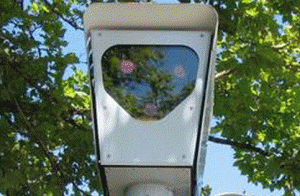Drive to remove red-light cameras speeds up in CA
by James Poulos | March 16, 2015 8:09 am
 Californians soon may put in the rear-view mirror the gaze of red-light cameras.
Californians soon may put in the rear-view mirror the gaze of red-light cameras.
In the wake of an appeals court ruling that defended the constitutionality of tickets issued to motorists caught running red lights, Assemblyman Matthew Harper, R-Huntington Beach, introduced[1] Assembly Bill 1160 to turn them off in the Golden State.
Cities have begun moving away from the unpopular devices, blamed for creating more accidents than they prevented. The cameras spread throughout California as an efficient way for municipalities to raise revenue by ticketing violators. But lawsuits and increased costs imposed by camera companies have discouraged their continued use.
In an interview with the Los Angeles Times, Harper noted[2] his concern with the “Big Brother” aspect of the cameras, which enable cities to police violations with automation, humans checking only later.
The California Court of Appeal ruled[3] against three San Bernardino County plaintiffs who had sued Redflex Traffic Systems, a red-light camera company based in Australia, for violating their constitutional rights as applied to confrontation, due process and probable cause. “The court leaned heavily on the state Supreme Court’s California v. Goldsmith decision from last June, a case that upheld the state evidence code that lawmakers re-wrote to declare automated tickets admissible as evidence,” reported[4] theNewspaper.com.
A big bother
Without constitutional recourse to the cameras’ Big Brother problem, Harper played up the prospect of legislative relief by emphasizing a different problem — the sheer bother the cameras impose on Californians.
“These cameras were put in place to reduce accidents, but are doing the exact opposite of what they were intended for,” he said[5] in a statement. “They are causing dangerous accidents, and taxpayers are shouldering the burden of maintaining them.” Calling the devices a failure “on all fronts,” Harper vowed that AB1160 “will end wasteful spending on an ineffective program and will make our roads safer at the same time.”
Conflicting data
Evidence appeared to be mixed, however. In Bakersfield, police told[6] ABC 23, “In the eight locations red light cameras are installed, crashes have significantly decreased and only a small number of secondary crashes, rear collisions, have been noted.” According to Sgt. Joe Grubbs, the cameras have helped[7] significantly reduce so-called “primary” collisions, such as head-on crashes and broadsides, “across the board.”
An engineering study conducted in 2013 showed primary collisions dropping between 46 and 73 percent at the Bakersfield intersections where red-light cameras were installed. As KBAK and KBFX Eyewitness News observed[8], so-called “secondary” collisions also decreased up to 63.7 percent at six out of eight intersections. “But at the remaining two locations, the number of secondary collisions went up. At Bernard Street and Oswell Street the increase was 84.2 percent, and secondary collisions went up by 15.5 percent at Coffee Road and Truxtun Avenue.”
A tide of disapproval
Despite the uncertainty surrounding just how unsafe red-light cameras may be, municipalities have had other incentives to drop them. Redflex has unsuccessfully tried[9] to get cities like Davis to pay over $1,000 more per camera and per month to “upgrade” the devices. Facing substantial costs and popular dissatisfaction, cities from Berkeley to Whittier simply have dropped them.
For Jay Beeber, the Golden State’s preeminent anti-red-light-camera activist, the trend is clear. “In California there were about 110 red light camera programs at one time or other,” he said[10]. “Since then, 73 jurisdictions have closed, banned cameras, or are about to close their programs. That leaves 39 continuing programs in California.”
The movement away from red-light cameras indicates one area where California Republicans can earn goodwill with Democrats — many of whom have viewed the cameras as part of a virtual racket used by police departments to cash in on hapless residents.
- introduced: http://www.news10.net/story/news/2015/03/09/ban-on-red-light-cameras-proposed/24672565/
- noted: http://www.latimes.com/local/lanow/la-me-ln-new-redlight-cameras-would-be-banned-under-bill-20150306-story.html
- ruled: http://www.courts.ca.gov/opinions/nonpub/G050278.PDF
- reported: http://www.thenewspaper.com/news/46/4653.asp
- said: https://ad74.assemblygop.com/press-release/6898
- told: http://www.turnto23.com/news/local-news/proposed-bill-would-get-rid-of-red-light-cameras-in-california-030915
- helped: http://www.bakersfieldnow.com/news/local/State-lawmaker-wants-end-to-red-light-cameras-Bakersfield-police-say-they-help-295438821.html
- observed: http://www.bakersfieldnow.com/news/local/State-lawmaker-wants-end-to-red-light-cameras-Bakersfield-police-say-they-help-295438821.html
- tried: http://www.thenewspaper.com/news/46/4642.asp
- said: http://www.laweekly.com/news/new-red-light-cameras-would-be-banned-under-proposed-law-5422622
Source URL: https://calwatchdog.com/2015/03/16/drive-to-remove-red-light-cameras-speeds-up-in-ca/